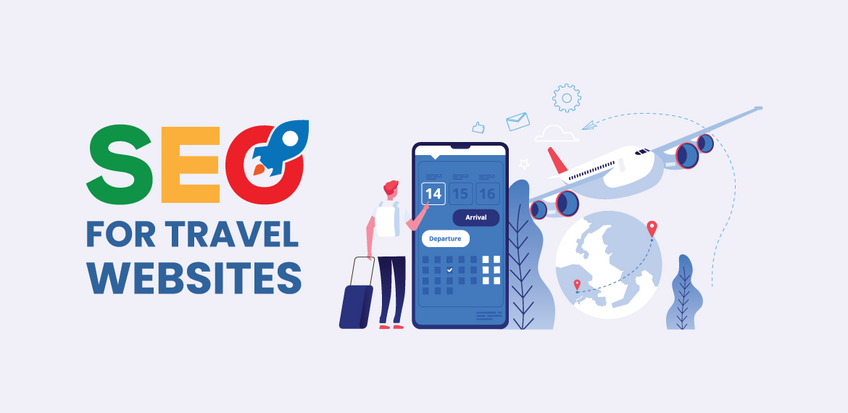A travel website must be optimized for search engines to draw organic traffic and raise exposure because millions of people use search engines to plan and book their trips.
How can you improve the number of reservations and sales on your travel website? How can you ensure that your travel company will expand steadily? Travel SEO is the solution.
Travel SEO is a word used to describe the series of measures you may take to optimize your travel website for search engines; it is not a theoretical notion.
Today, we will have a look at steps that you can take to optimize your website and gain more business.
Why Is Travel SEO Important?
If you own a travel website or blog and are new to SEO and digital marketing, the first thing you should know is why SEO is crucial for the success of your website and what advantages it offers your company.
Let’s begin by giving a brief overview of SEO and, more specifically, its use. Why is SEO important to those working in the tourism industry?
Getting More Leads From Search Engines
With SEO, a website may rank better in SERPS for keywords associated with its industry. For instance, the websites optimized for SEO will appear first in the search results when a user puts in “rent a villa in Sicily” (after the sponsored advertisements – more on that below). This will result in more qualified leads for such websites.
A Google study of ‘travelers” behavior revealed that many consumers begin their travel and booking processes on search engines.
You are already losing a substantial portion of your prospective clients to rivals if your website does not have solid results for your company’s keywords.
More Cost-Effective Compared To The Next Best Alternative
While non-SEO travel websites won’t appear in the top results naturally, companies may still acquire traffic from such queries using PPC, particularly Google AdWords.
While this is an acceptable practice and AdWords is one of the finest methods to increase highly focused website traffic quickly, SEO is more cost-effective in the long run.
The explanation is straightforward: with AdWords, traffic will decline after you stop advertising, however, with SEO, focused traffic will come in continuously once you attain high ranks. Additionally, you will have to pay a few dollars per click for each visit you receive via AdWords, which might reduce traffic and impact conversion rates depending on your daily budget.
How to SEO your Travel Website
Local SEO
Local SEO comes first on the list. Local search engine optimization (local SEO) is a technique for making your website more visible to users searching nearby or using a mobile device to find your location.
You need to do a variety of actions to get your company ranked in the local SEO results, including:
- Verify your business address in Google My Business by creating an account.
- Complete your Google My Business profile with the correct contact information, business-related photographs, and other details.
- Publish schema details on your homepage.
- On your homepage, include your address.
- Optimize your page names, h1 tags, and descriptions to mention your location correctly.
- Obtain high-quality connections from regional and other reputable websites.
- Ensure that your company’s name, address, and phone number are consistent across all platforms (including social media sites, local directories, your website, and Google Maps).
The above list is not exhaustive, but it will get you going.
Homepage SEO
The homepage is crucial for all websites, but for travel websites, it is particularly crucial. Your homepage’s content should include the following topics:
- Beautiful images of your homes
- Nice pictures of joyful vacationers
- Your most well-liked residences
- Special bargains or discounts
- Your blog’s most well-liked articles
- Describe your company briefly, highlighting how your properties and services stand out.
- A simple way for visitors to look for residences (by location, style, amenities, or price)
Technical SEO
In addition to the elements above, you should consider the significance of technical SEO tactics.
For instance, a fully optimized travel website must-have features like page speed, mobile friendliness, correct use of canonical URLs, the 404 page, correct implementation of multi-language websites, paging, image and video optimization, sitemaps, correct configuration of Google Webmaster tools, and many more.
Blogging
As I’ve stated several times, travel is a visually appealing subject. People enjoy looking at pictures of homes and locations to acquire ideas for where to travel on vacation.
In addition to the visual component, traveling is also an experience, and blogging and content marketing are the ideal ways to share experiences and set expectations for the experience your travel agency can provide potential customers.
Conclusion
Any travel website’s success depends on having a solid SEO strategy. Travel companies may increase their online exposure and draw organic visitors by conducting thorough keyword research, producing high-quality content, optimizing for mobile, enhancing page load speed, and applying local SEO, link building, rich snippets, and social network integration.
In addition to enhancing search engine results, a properly implemented SEO strategy offers travelers helpful content that encourages them to use the website for their trip planning and reservations.
A strong and modern SEO approach will pay off handsomely for travel organizations looking for long-term success as the travel industry develops.






